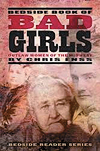
Bedside Book of Bad Girls: Outlaw Women of the Midwest, by Chris Enss, Farcountry Press, Helena, Mont., 2012, $14.95
Behind many a bad man there was a bad woman…and in some cases in the Old West she might take the lead. Such is the underlying theme of Chris Enss’ entry in Farcountry Press’ Bedside Reader series, which showcases women who made their mark in the Midwest during the transition from frontier days. The entries include classic cases ranging from Sarah Quantrill, whose notoriety was primarily by association through her marriage to Confederate bushwhacker Colonel William Clarke Quantrill, to Flora Mundis, who took her own initiative as a gambler, prostitute and horse thief disguised as a man. Suspected of taking even more “initiative” was Kate Bender, who may have been the mastermind behind her family business in Labette County, Kansas—a way station at which an alarming number of travelers with worthwhile personal assets checked in but never checked out.
Enss highlights the occasional sexism on which notoriety is based, as in the case of “Poker Alice” Ivers. Although she was generally regarded as a bad girl for making a career of gambling, she prided herself on running an honest game all her life, even though she kept a loaded gun handy in case anyone might violently dispute it. Also straddling the fence between good and not so good is Victoria Woodhull, a healer-spiritualist (read “charlatan”) who in 1872 became the first woman nominated to run for the presidency of the United States—a bold move permitted under the same Constitution that denied women the vote—but was undermined by her “free love” platform, which angered other women suffragettes.
Less disputable is Arizona “Ma” Barker, alleged brains behind the Barker-Karpis Gang, which kept the Midwest wild well into the 20th century. Surviving member Alvin Karpis insisted Barker “was just a plain little hillbilly out of the Ozarks” who “never even knew how to use a machine gun.” Ma’s tale, like the bulk of Enss’ anecdotes, occurred after the pioneer days of the Midwest had long passed, but she does serve up intriguing tales of women who operated on either or both sides of the law. For Wild West neophytes who think only men stepped over the line, Bad Girls serves as a good primer to how often the opposite sex could match or beat the boys at that game.
Jon Guttman




